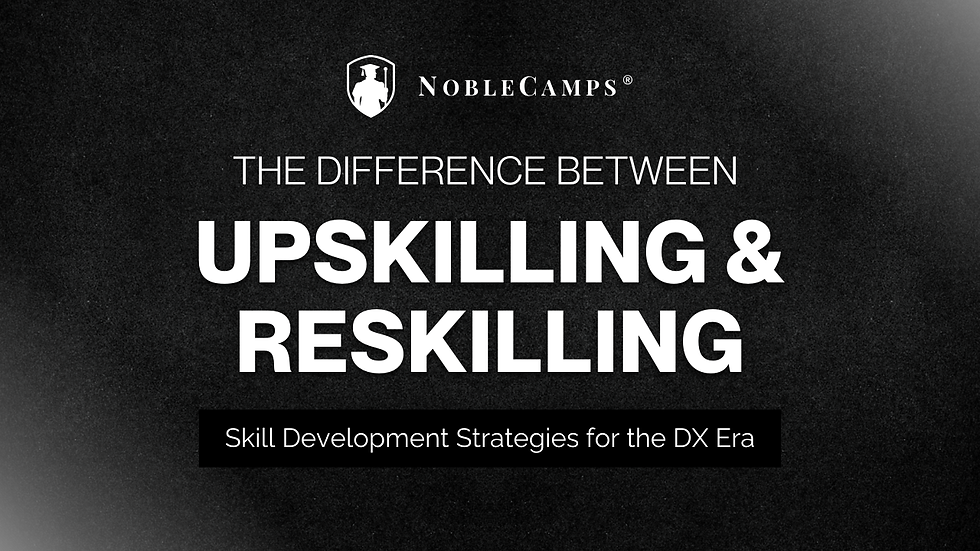The Difference Between Upskilling & Reskilling
- Aug 5, 2025
- 4 min read
Updated: Feb 4

Strategic Talent Development for the DX Era
In today’s fast-evolving business landscape, driven by digital transformation (DX) and intensifying global competition, companies face growing challenges — especially in the areas of skill shortages and adaptability.
To remain competitive, many organizations are now investing more in employee skill development than ever before. Two essential strategies gaining attention are upskilling and reskilling.
While both aim to enhance employee capabilities, their definitions, purposes, and approaches differ significantly. This article explains the key differences between upskilling and reskilling, and how organizations can leverage both to develop DX-ready talent and build a future-proof workforce.
What is Upskilling?
Upskilling refers to improving or deepening the skills needed in one’s current role. The goal is to help employees become more specialized and effective within their existing job functions.
For example, a marketing professional who learns how to use AI for data analysis — and applies it within their current role — is upskilling.
Because the job title doesn’t change, upskilling strengthens one’s expertise in a familiar area. In fast-paced industries where knowledge becomes outdated quickly, continuously building on existing skills is essential.
Upskilling benefits both employees and organizations by boosting performance, driving innovation, and improving operational efficiency.
What is Reskilling?
Reskilling, on the other hand, means learning entirely new skills to transition into a different role or field. It’s a “relearning” process to help employees shift away from their current skill sets and enter new areas of work.
For instance, if the same marketing professional learns programming and moves into a tech role as an engineer, this would be reskilling.
With automation and AI transforming many job functions, companies increasingly need to reassign employees to different roles rather than rely solely on hiring.
Reskilling expands employees' career options and helps organizations adapt to change by making better use of internal talent.
It’s not just a response to job loss — it’s a long-term investment in adaptability and sustainability.
Key Differences Between Upskilling & Reskilling
While both approaches support skill development, the purpose and direction of each differ.
1. Career Direction
Upskilling: Enhances expertise within the current career path.
Reskilling: Prepares employees for an entirely new career path.
2. Content of Learning
Upskilling: Focuses on learning new tools, methods, or knowledge directly related to one’s current role.
Reskilling: Involves acquiring new foundational skills for a different job function.
3. Impact on Employees & Companies
Upskilling: Boosts productivity and deepens in-house expertise.
Reskilling: Increases employability, enhances flexibility, and helps companies repurpose existing talent instead of letting go.
Both approaches are complementary — not competing. The choice depends on business needs, workforce gaps, and each employee’s career goals.

Why Upskilling & Reskilling Matter in the DX Era
As digital transformation accelerates, it’s predicted that many future jobs will require skills that don’t yet exist.
Merely updating existing knowledge (upskilling) is no longer enough — employees must also be equipped to enter new domains (reskilling).
Forward-looking companies must combine both approaches to develop adaptable, DX-ready talent.
Global Reskilling Revolution
Globally, large-scale skill development initiatives are already underway.
At the World Economic Forum (WEF) in 2020, the “Reskilling Revolution” was launched with the goal of providing better education, skills, and economic opportunity to 1 billion people by 2030.
This reflects the urgency of upskilling and reskilling not just at the company level — but across industries and nations.
Japan’s Move Toward DX Talent Development
In Japan, interest in DX talent development is also growing.
In 2018, the government launched "Re-Skill Courses" to train workers in AI, IoT, and big data. In 2020, the Ministry of Economy, Trade and Industry emphasized the importance of reskilling in its Human Capital Management Report.
The recognition that employees are the key to sustainable business growth is now driving public and private initiatives alike.
Skills Strategy = Long-Term Business Investment
In the DX era, people are a company’s most important capital — not just resources.
This mindset shift, known as human capital management, emphasizes long-term investment in employee development.
Instead of relying solely on external hires (which are costly and risky), companies that cultivate internal talent are more agile and resilient.
But learning shouldn’t be left entirely to individuals. Employers must also provide the time, structure, and support needed for meaningful upskilling and reskilling.
Building a Strategic Training System
Effective skill development requires more than occasional training. A company-wide system must be in place.
Here are 5 key components of a successful approach:
Align with Business Strategy Identify key skills needed based on future goals and growth areas.
Use Diverse Training Formats Combine in-person workshops, online learning, and blended methods.
Link to Career Goals Support employee motivation by connecting training to their personal growth.
Secure Learning Time Integrate learning into working hours to eliminate time barriers.
Apply Learning to Real Work Ensure employees can immediately use new skills in live projects.
Boost Real-World Skills with NobleCamps
NobleCamps provides custom corporate training programs designed to enhance practical, in-demand skills.
Our Business Bootcamps focus on:
Problem-solving
Digital literacy
Strategic thinking
Programs are typically 10 days and customizable to your team’s size, industry, and objectives. Our training programs are delivered on-site around the world, with proven success in Japan, San Francisco, South Korea, and Singapore — ideal for global teams.
Ready to close your skill gap?
Whether you're just starting your DX journey or ready to elevate your workforce, our team is here to help.
Contact us for a consultation or free quote for your corporate training program.


